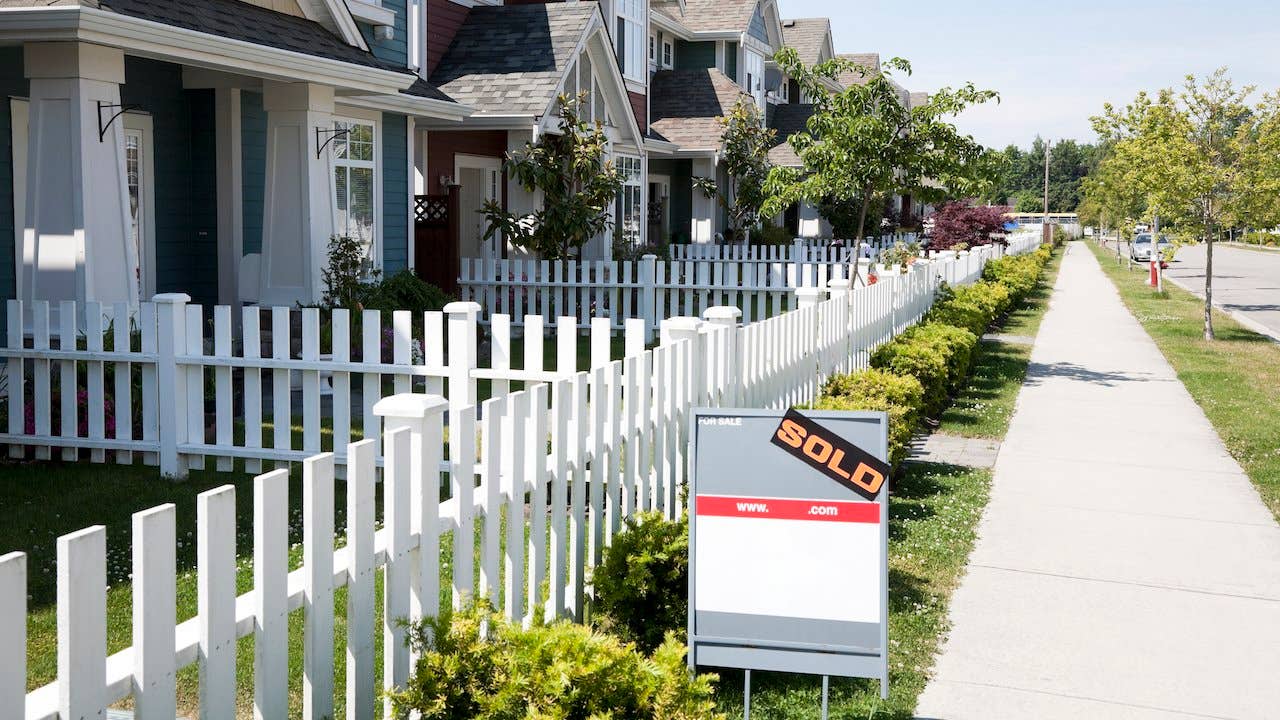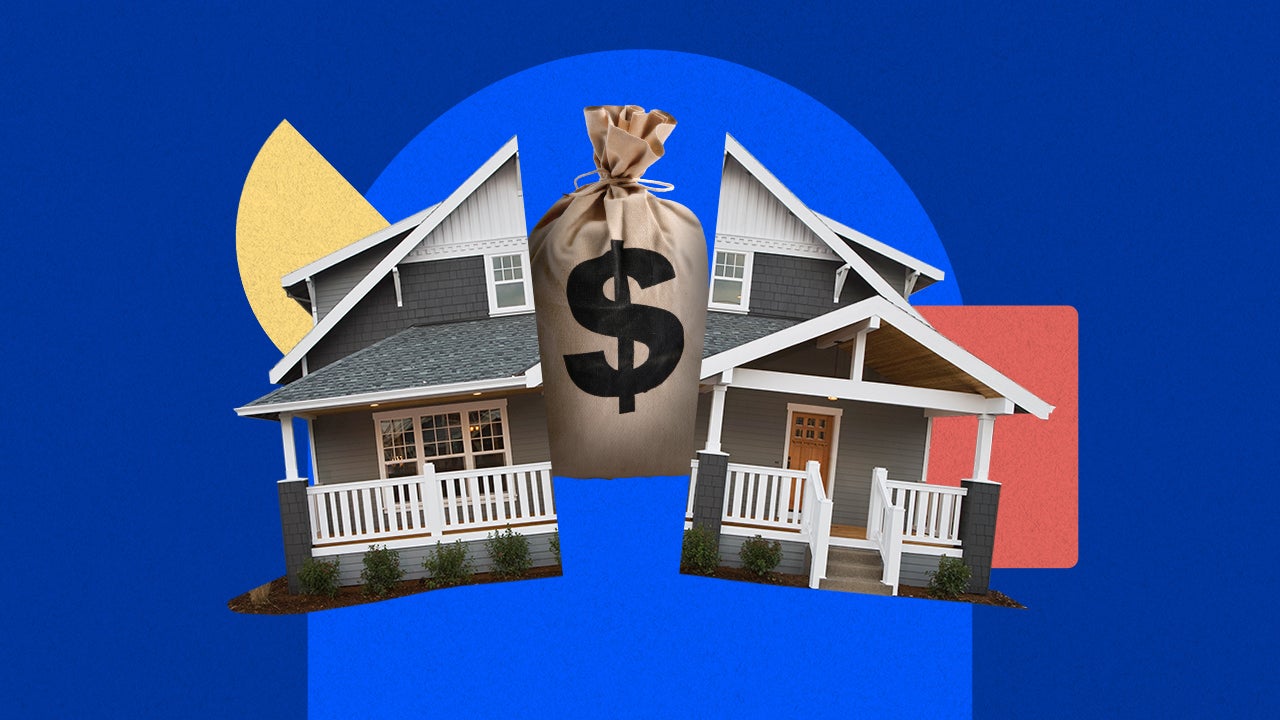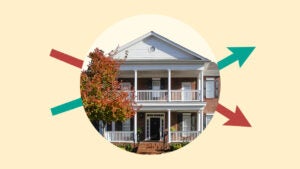Can you buy a house with cash? Is it smart?




Key takeaways
- Buying a home with cash means avoiding financing and mortgage payments, but it requires a large sum of money.
- Cash home purchases have become increasingly popular in today's high-interest-rate environment.
- If you can afford it, cash home purchases have major benefits. But there are disadvantages, too, including tying up your money in an illiquid asset.
If you’re shopping for a home in today’s high-interest-rate market, you might wish you could skip the financing and buy the place outright. There has always been a competitive advantage to making an all-cash offer, but when mortgage rates are high, there’s another: Borrowing money is expensive, and paying for the home in full helps you avoid the monthly obligation of mortgage payments and interest.
More people have taken this route in recent years, with the percentage of buyers using a mortgage to purchase a home falling from 87 percent in 2021 to 80 percent in 2023, according to the National Association of Realtors’ latest Profile of Home Buyers and Sellers.
Of course, most Americans don’t have hundreds of thousands of dollars lying around waiting to be spent. But let’s say you do. Even if you can afford to buy a house in cash, should you? Is it a smart idea? Here are the pros and cons.
Can you buy a house in full, without financing?
Yes, it is possible and perfectly legal to purchase a home in full, just as you would a smaller-ticket item like, say, a coat. This is referred to as an all-cash deal, even if you’re not actually paying in paper money. (While you could technically dump a mountain of dollar bills onto the closing table, the IRS has reporting requirements for such large cash transactions.) According to NAR data, 28 percent of all home sales in May 2024 were all-cash deals.
If someone is selling a property for $250,000, for example, and you have that sum in your bank account, there’s no reason you couldn’t simply buy it upfront all at once. A cash home purchase just means you’re paying the agreed-upon price in full, rather than via financing. You’re drawing from your own resources — be they savings, sales of investment assets, retirement account withdrawals, or financial gifts from other people — as opposed to seeking a loan. The bottom line: You’re not borrowing money to buy the home. (Though there may be tax consequences.)
Pros and cons of buying a house with cash
There are both advantages and drawbacks to paying cash compared to getting a mortgage.
Pros
- Competitive advantage: Sellers love all-cash bids, and buyers get to avoid the risk of potentially not being able to secure a loan. With an offer contingent on financing, there’s always the chance a loan could fall through, and the deal with it. That makes cash offers more attractive, giving your bid a leg up on others.
- Lower purchase price: Because cash deals are more appealing than ones that involve financing, you might be able to win a home with a lower offer. Sellers may be more willing to bargain, because your bid seems like a surer thing.
- Lower closing costs/faster closing: Many closing costs, and delays, are related to securing a mortgage. Skipping the loan process makes the closing proceed faster and with less expense.
- No monthly payments: If you pay for your home in full, you don’t have to worry about interest rates or monthly mortgage bills.
- Immediate ownership: In addition, when you pay for a home in full, you own it outright. That means there’s no risk of foreclosure by a lender and you have 100 percent equity in the home.
Cons
- Your money is tied up: Real estate can be a good investment — but it’s an illiquid one. If your money is tied up in your home, it’s no longer readily available for other purposes, such as home maintenance, emergencies or even to pay bills.
- Lower return on investment: Real estate is certainly an asset, but it might not appreciate in value as quickly as other investments can. For example, you might miss out on higher returns in the stock market if you put all your cash into a home.
- No mortgage interest deduction: Homeowners can deduct a portion of the interest they pay on their mortgage from their income when filing their tax return. If you don’t have a mortgage, you miss out on these savings.
Things to note about all-cash offers
All-cash offers are different from those that involve loans — but some of the same rules apply.
- You should still do your due diligence: When you get a mortgage, an appraisal is required by the lender to assess the home’s value. An appraisal is still important when you’re paying cash, to make sure you’re not drastically overpaying. Be sure to do a thorough final walk-through, too.
- You have to provide financial documentation: When you make your offer, expect the seller to want to see proof you have the funds to back it up. Have bank and investment statements ready, and possibly tax returns as well. If you’re using gift money, there should be letters of intent stating so. You may also still need to provide earnest money.
- You still pay closing costs: Cash buyers get to skip loan-related closing costs, but you’re still responsible for attorney and Realtor fees, as well as other potential closing costs.
- You need the cash at closing: You’ll need to transfer funds to the seller on closing day, so make sure you know how this will work ahead of time. Common methods are to bring a cashier’s check or to wire funds to a settlement agent. Your real estate agent or attorney can help determine the logistics.
Alternatives to paying cash
- For the benefits of making a cash offer without having to tie up all of your money in your home, delayed financing might be an appealing choice. In effect, you pay cash for a property, then get a mortgage after completing the purchase — similar to completing a cash-out refinance after you purchase the home. You still need to have enough cash upfront to pay for the home, but this strategy gives you the competitive advantage of a cash purchase, while then providing you with some cash to keep you liquid afterwards.
- You could also consider a larger down payment, which would mean financing a smaller portion of the home. If you can pay half of the purchase price outright, for example, that strengthens your offer and helps you reduce the cost of a mortgage, since you’re borrowing less overall.
- There are also companies out there, like Knock and Flyhomes, that can help you make an all-cash offer so you can compete in especially hot markets.
Bottom line
If you can afford to, buying a home with cash can make your offer more appealing to sellers and speed up the closing process once your offer is accepted. And avoiding a mortgage means saving plenty of money in closing costs and interest over time. Plus, you’ll immediately own your home free-and-clear.
However, most people do not have enough savings to afford a cash purchase. And cash purchases have drawbacks, as well: You’re tying your money up in an illiquid asset. If you have to drain all your investment accounts for the purchase, you’re losing out on good opportunities for long-term financial growth. But, while too much debt is never good, a mortgage isn’t as much of a liability as, say, credit card debt or student loans. In fact, mortgage obligations can sometimes be considered “good” debt, because they go toward building equity in an asset, and having one can actually improve your credit history — as long as you make payments promptly.
Why we ask for feedback Your feedback helps us improve our content and services. It takes less than a minute to complete.
Your responses are anonymous and will only be used for improving our website.




